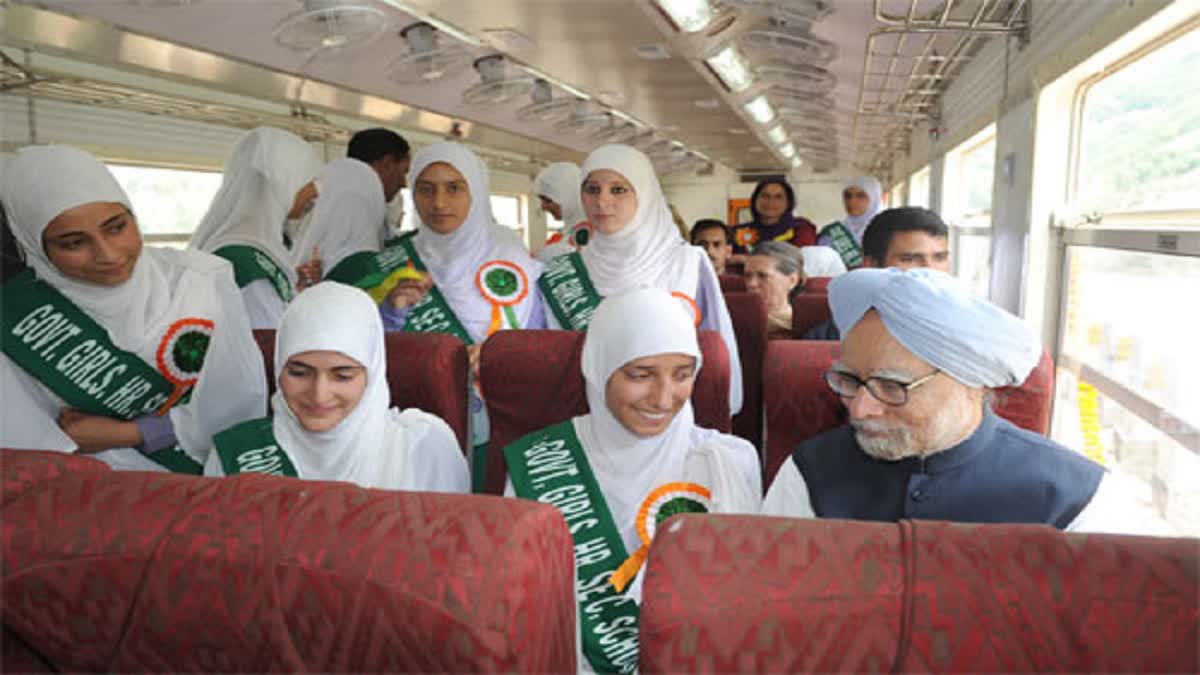Jammu: Apart from being celebrated as "the ambassador of peace for Jammu and Kashmir," former Prime Minister Manmohan Singh, who passed away on Thursday in AIIMS New Delhi at the age of 92, was the one who gave impetus to the development in Jammu and Kashmir.
Train to Kashmir, implementation of the 73rd and 74th amendments regarding Panchayati Raj institutions, Satellite Township like Jagti in the Nagrota area of Jammu for displaced Kashmiri Pandits, a relief package for refugees of Pakistan-occupied Jammu and Kashmir (POJK), and four-laning of the Jammu-Srinagar national highway are a few of his works that are credited to his name.
On April 13, 2005, Manmohan Singh gave the people of Udhampur a gift on Baisakhi by inaugurating the first train from Udhampur to New Delhi when he flagged off the Uttar Sampark Kranti train from the region. It was on this day that he announced the construction of the Udhampur-Srinagar-Baramulla Rail Link (USBRL) and made it a national project. “This project would not be allowed to starve for funds,” were his words after announcing the project.
On October 11, 2008, Kashmir got its first local train service, and it was Singh, then PM, who inaugurated it from Nowgam in Srinagar to Anantnag. On June 26, 2013, he connected Qazigund in Kashmir to Banihal of the Ramban district in Jammu by train.
After flagging off the first train from Udhampur in 2005, he wanted the people of Jammu and Kashmir to become partners of development and asked the state government to allow the implementation of the 73rd and 74th amendments regarding Panchayati Raj institutions. The credit for strengthening the Panchayati Raj institutions in J&K also goes to Manmohan Singh, and today, if the three-tier Panchayati Raj system is in place, it is because of his efforts.
Another gift of the former PM to Jammu and Kashmir was the upgrading of the two-lane Jammu-Srinagar national highway to a four-lane highway, which is also nearing completion. Within a year or so, it is expected to be completed.
In the early 1990s, when Kashmiri Pandits migrated from Kashmir to Jammu and other parts of the state and the country, it was during Singh’s tenure as PM that the Satellite Township for Kashmiri Pandits was approved and constructed in Jagti Township, and every deserving KP family got their own house. Till then they were living in tents and/or on rent in the worst conditions.
During 1947 many Pakistan-Occupied Jammu and Kashmir (POJK) refugees were waiting for a relief package to live a respectable life here, and it was only during Manmohan Singh’s tenure that their process started.
Talking to ETV Bharat, leader of POJK refugees Rajiv Chunni said, “Manmohan Singh was a great personality who met POJK refugees thrice during his 10-year term in office, twice in New Delhi and once in Srinagar. When we presented our case, he directed Ambika Soni, the then AICC in charge of J&K, to ensure that a resolution is passed from the J&K cabinet regarding us.”
“While listening to us, he had said, ‘I am also a refugee who had come with one trunk,’ Chunni remembered.
Manmohan Singh’s relationship with J&K wasn’t limited to his term as PM only, but he was a regular visitor to this erstwhile state.
Remembering his talks with Manmohan Singh while travelling from the guest house in Jammu to RS Pura in 1999, Dinesh Malhotra, a senior journalist of Jammu, said, “We travelled together for around 40 to 45 minutes, and what I could make out of him was that he was a simple and sober personality who wanted peace for Jammu and Kashmir. He was then the leader of the opposition in the parliament and was in Jammu to campaign for Congress candidate Madan Lal Sharma for MP elections.”
“During that tour, he held a press conference in Asia Hotel in Jammu where, before the conference, there was a fight between a few reporters. When someone asked Manmohan Singh to start the press conference, his reply was, ‘Pehlay apne maslay khatam karo (first resolve your issues),’” Malhotra recalls.
Read More



